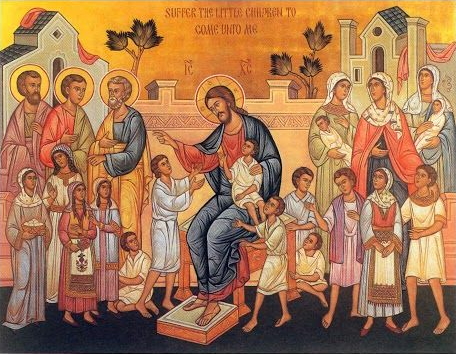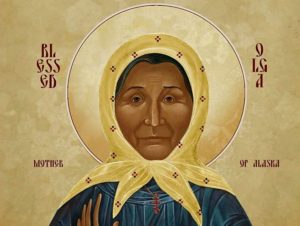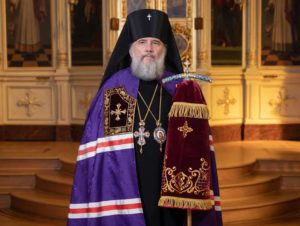ENCYCLICAL OF HIS GRACE, BISHOP PAUL ON FAMILY LIFE
January 24, 2017
Blessed Xenia of Petersburg
№. 12
To all Clergy, Monastics, and Faithful in the Diocese of the Midwest
Very Reverend and Reverend Fathers and Mothers, Beloved Brothers and Sisters in Christ,
Christ is in our midst!
My first job after earning my Bachelor’s Degree in Psychology in 1976 was as a childcare worker in a home for physically, sexually, and emotionally abused children. And after I received my Masters of Social Work Degree in 1980, I worked for four years as a residential caseworker, offering individual therapy with families and children in the same type of setting. I saw kids for individual therapy once a week for forty-five minutes, and families twice a month for counseling. What struck me by this time is that if children were going to make any behavior gains in their treatment, the other 23 hours of the day were crucial in the home environment they lived in with the child care workers.
 I share this at the outset as a way to introduce my desire to talk about family life and the Orthodox Christian faith. Most of our families have their children enrolled in some type of Church school in their parishes that runs about forty-five minutes every week. The point is to learn the Orthodox Christian faith and its practice. Realistically, however, forty-five minutes each week is akin to seeing a child in therapy for the same amount of time. The real impact of anything a child learns in Church school will be measured in how the Faith is lived out in their family life, not unlike children in a residential environment with his or her childcare workers the other twenty-three hours in a day. So this letter is about the other 23 hours in the lives of our Orthodox Christian youth in their families.
I share this at the outset as a way to introduce my desire to talk about family life and the Orthodox Christian faith. Most of our families have their children enrolled in some type of Church school in their parishes that runs about forty-five minutes every week. The point is to learn the Orthodox Christian faith and its practice. Realistically, however, forty-five minutes each week is akin to seeing a child in therapy for the same amount of time. The real impact of anything a child learns in Church school will be measured in how the Faith is lived out in their family life, not unlike children in a residential environment with his or her childcare workers the other twenty-three hours in a day. So this letter is about the other 23 hours in the lives of our Orthodox Christian youth in their families.
Years ago, a mother asked me how to get her children prepared for church on Sunday mornings. “It starts with what you do on Monday,” I responded. “You don’t wait until Saturday night or Sunday morning.” In other words,
- If we don’t pray, we are doing something else instead.
- If we don’t practice almsgiving, we are doing something else instead.
- If we don’t read Scripture, we are reading something else instead.
- If we want to witness Christian formation happen in our children, that formation needs to happen in the home.
At the last Diocesan Assembly I spoke of the importance of seeing the family as a “little Church.” This is crucial to understanding how we “keep our children in the Church.” In reality, it is not we who actually keep them in the Church; rather, our children have to own that decision and make it their own. This means they need the freedom to say “no,” or the choice is not voluntary.
What do I want to see happen in our Diocese when it comes to youth? Of course I support such things as an annual diocesan-wide youth activity. I think the camp programs are great, and I look forward to visiting them in the summer. I think it is good to see parishes cooperating with other OCA parishes, as well as those of other jurisdictions, in planning various youth activities and ministries. Surely, these are worthy efforts.
But I would like to see our Diocese begin to embrace the concept of the family as the little Church that it is, and to develop resources to support this vision. I think this is where real Christian formation takes place.
I would like to see a website developed that serves as a center for pointing people to resources they can use to assist them in ordering their home life in an Orthodox Christian manner. Such a site would provide resources that detail what kind of things should be happening in the home in order to provide a positive foundation for Orthodox Christian formation.
Of course, the home, as the little Church, should be a place of prayer, family meals, Scripture reading, engaging in family charitable activities. The home should be a place where repentance and forgiveness is experienced. But for those who especially attend public schools or are involved in multiple activities and commitments, this is not as easy as it sounds.
Our children and youth also are exposed to lifestyles and values that are contrary to our Faith and teaching. Consequently, our homes need to be places where they can talk with parents about their concerns, where difficult issues can be openly discussed rather than dismissed with the notion that what someone does “is wrong” or it is “no big deal.” As important as morality is, there are other things for which we will be judged that our Lord deems to be more important.
We live in a world in which so many youth are sexually active, with little to no sense of right or wrong (whether homosexual or heterosexual). How can we help them to see the positive value in abstaining from sexual relations before marriage? Instead of coming across as a Church with “moral codes,” how can we help our children to understand that despite the value differences, their peers and fellow students should not be seen as adversaries? They too are made in God’s image and likeness and are capable of kindnesses, compassion and acts of charity. Things are not all bad or all good in this fallen world; that will finally be sorted out when the Lord comes in judgment, when He will separate the sheep from the goats.
Here is my vision for the website, mentioned above, devoted to the reality of the family as a “little Church.”
- It would be a place that could identify resources to support families and provide people with appropriate links.
- It would be a place for reflections offered by clergy and laypersons that will especially address today’s challenges in terms of lifestyle issues, as well as the impact of modern technology on learning and family life.
- It would be a place where our youth and young adults could offer their thoughts on what they deal with daily in their lives and offer solutions or recommendations.
- It would be a place where the Bishop could offer periodic reflections on the theme of family life — or even a monthly chat session with people in the diocese to discuss what is on their minds regarding family, faith, and kids.
- It would be a place where people could learn more about ordering their home life in such a manner as to make it more conducive to integrating families into the worship of the Church.
- It would be a place where families can learn more about the importance of living the ascetical life as a necessary and positive aspect of embracing the formation of the Christian life and virtue. Asceticism — especially prayer, fasting and almsgiving — is not just for monks and nuns.
- It would be a place where families could learn more about our sacramental life and its relationship to asceticism.
- It would be a place where family activities could be shared, thereby helping to build up our life in Christ.
In our witness to call people to repentance and His coming Kingdom,
- We are not to be puritans that hate the world and matter, or advocating an “us vs. them” mentality.
- We are called to embrace all that is given to us to use in a manner that glorifies our Creator.
- We are stewards of God’s creation; family life is a stewardship issue
Recently, I noticed that the Greek Orthodox Archdiocese of America’s Metropolis of Atlanta has a website devoted specifically to the topic of Orthodox Family Life — http://www.familylifeministry.atlanta.goarch.org/. The Greek Orthodox Metropolis of Chicago also has a similar resource. I have spoken with Mrs. Daria Petrykowski, long-time educator and a member of our Diocesan Council and Father John Matusiak, our Diocese’s Communications Director, about developing such a website for our diocese. I am certain that there are others as well who have the skills to help. However, before doing so, I thought it wise to share my thoughts and hopes as a means of introducing this idea. A more detailed plan and the means to fund it would naturally follow. I look forward to hearing from you regarding any suggestions or comments you might have. Please do not hesitate to share your thoughts.
Thank you for taking the time to read this. Take care — you are always in my prayers, and I ask that you please keep me in yours as we embark on this vision together.
+Paul
Bishop of Chicago and the Midwest
To be circulated among the faithful of the Diocese.
Watch video of Family Life Encyclical delivered by His Grace, Bishop Paul



